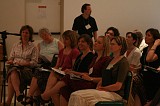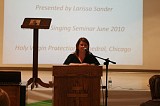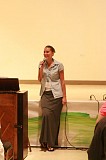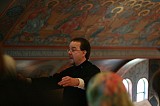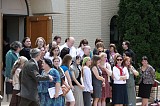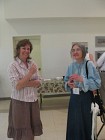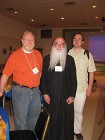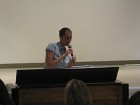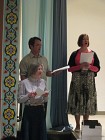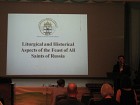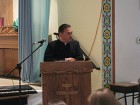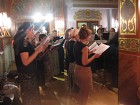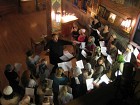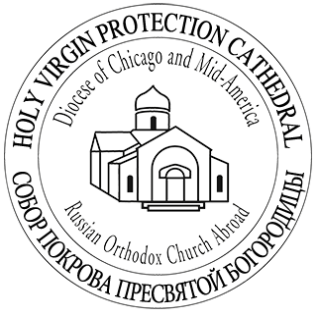From the 4th to the 6th of June at the Holy Virgin Protection Cathedral in Chicago a diocesan choir conference was held which gathered directors and singers from all corners of our geographically diverse diocese - from Texas to Cleveland - as well as several attendees from different dioceses and jurisdictions. The last time such an event took place dates back to 1997 in Chicago and for this reason the current seminar elicited a large response among kliros singers. The joy of sharing similar experiences filled the atmosphere of the conference and this spiritual solidarity found its expression in the first chords of our moleben hymn “O Heavenly King” at the opening of the conference.
The 2-day program was filled with lectures and seminars which had as their goal the raising of the level of liturgical and musical aptitude of those working in the church music field. To a large extent, the success of the conference is owed to the participation of highly qualified church musicians who have worked on the kliros both in our diocese and beyond. The names of music professors Kurt Sanders and Peter Jermihow, and of Protodeacon Vadim Gan do not need further introduction. According to the feedback of conference attendees, the most practical and useful lectures focused on singing well in English and lessons in teaching choristers how to read music, as presented by Larissa Sander and Julianna Campbell respectively, both professional musicians with experience in pedagogic techniques.
Conductors from distant parishes were grateful to their colleague Reader Michael Gill, director of the Chicago pontifical choir, for his detailed analysis of hierarchical services. Issues related to achieving harmony between the altar and kliros found expression in the talk by the chairman of the Diocesan Music Committee and conductor of the St. Sergius Cathedral in Cleveland, Reader Alexander Petrowsky. Two lectures were devoted to the “Ochtoekos” and various aspects of stikhera singing in which the importance of attention to text and liturgical context were of were emphasized as the basis of establishing an “obikhod.”
One of the highlights of the Conference was a demonstration by a quartet under the direction of Peter Jermihow, who pointed out the use of various styles and harmonizations for “obikhod” singing according to the method of A. Kastalsky. Reader Sergey Furmanov presented the historical and liturgical development of the service of All Saints of Russia, which fell this year on June 6 (May 24 old style). The beloved stikhera “O Land of Russia” was a special prayer to the Lord for the preservation of Orthodoxy in Russia and a tribute to the established tradition of concluding church music conferences with this particular hymn.
The conference participants also sang the Vigil and hierarchical Divine Liturgy services. Many of the pieces were specially selected to be accessible to choirs back home. Services were conducted by several of the lectors. It was particularly gratifying to see that many of the attendees partook of the Holy Mysteries. After the Divine Liturgy, the cathedral sisterhood prepared a delicious Lenten meal to thank all of the singers. For many, it was difficult to part company after the conference, having formed new friendships and bonds through shared kliros experiences.
Recordings:
Vespers
Psalm 103
Great Litany
Blessed is the Man
O Gladsome Light
Lord Now Lettest Thou Thy Sevant
Blessed be the Name...Little Doxology
Mattins
Praise Ye the Name
Evlogitaria
Gradual
My Soul Doth Magnify
Divine Liturgy
Greeting of the bishop
Great Litany and first antiphon
Second antiphon
Alleluia
Cherubic Hymn
Anaphora


